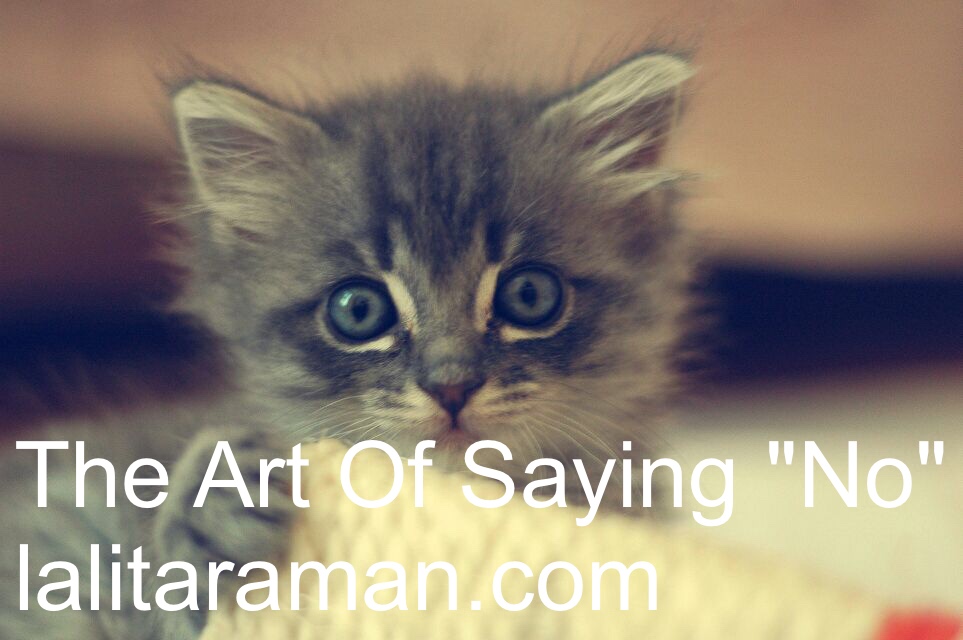Do you face the Fear of
→Losing a client or
→Hurting someone’s feelings or
→Upsetting your boss or
→A bad reputation or
→Being called arrogant and rude or
→Turned away from a deal
Do these fears therefore restrict your ability to say “No” even though that is your most desired response in that moment of decision.
Saying “No” is one of the biggest challenges for most people.
For most, their self- confidence and communication skill is challenged, when they have to say “No”. It causes stress and anxiety and they rather say Yes than No so as to avoid potential discomfort.
However, by over committing, you thin yourself out, leading to stress and overwhelm which in turn can affect your ability to deliver with excellence.
Research from the University of California in San Francisco shows that the more difficulty you have saying no, the more likely you are to experience stress, burnout, and even depression (three things that hinder your emotional intelligence). Source : Forbes
I’ve learnt the art of saying “No”, when required over the years. Despite this, I still struggle at times, with saying “No”, when it comes to some existing clients or in the case of potential business opportunity or with respect to some people.
How do I remind myself about the importance of saying “No”, no matter how difficult it may be? I do so in the following five key ways:
1. Prioritize
Each of us have the same 24 hours given in a day. How we choose to use it depends on us and the priorities we set ourselves.
It is necessary to prioritize because not all the things can be done at the same time or on the same day nor is it possible to please everyone. Value your time. How are you prioritizing ? Are you sticking by it once you have determined what is the priority on that day?
2. Communicate
You may be struggling with the “No” because you don’t want to hurt the other person’s feelings, or you feel it is beyond your comfort zone because the recipient may be your boss or client or someone to whom you have never said a “No”. Saying “No” is not bad, all depends on how you say it.
You need to think about the tone and the words you are going to use to communicate the “No”. If you understand how your stakeholders have been influenced culturally through “the language they speak” , you will be able to articulate the “No” in a manner that does not hurt the recipient.
Be assertive and that does not mean arrogance or being rude. Sleep on it so that you can reframe the way you say the “No”.
3. Are you saying “No” to yourself or other things
In your day how many times should you be saying “No” to yourself in doing some activities or being someone else when you should be saying “Yes” to other things or being your true self.
By saying “Yes” to others, if you are denying yourself something or not doing something else which needs attention, what is the end result. Is it desirable?
4. Finding Your Yes
Start by focusing on the Yes. This will enable you to remind yourself of your priorities and thus say “No”, when required. How will you say “No”, if you didn’t know what you should say Yes to.
5. How is it beneficial ?
Would you rather say “No” instead of keeping somebody waiting for a response? Often, when people have to say no to a proposal or a candidate, they avoid the situation and choose not to respond or hinge on being cagey and vague. By doing so, you are giving unnecessary hope to someone. Think about the benefits of saying “No”.
It is about being articulate and perhaps even persuasive by saying “No”.
What are some of the ways you are saying “No”?
What stops you from saying “No”?
For one-on-one coaching, speaking, workshops, and/or training, let’s Connect


Thanks for the tips. I’m not very good at saying no because I don’t want to hurt the person’s feelings.
Thank you Nicole. Saying “No” many times is the most difficult. One way to encourage yourself is to think about the times you have said yes and either as a result or therefore, what are you saying ‘no’ to?